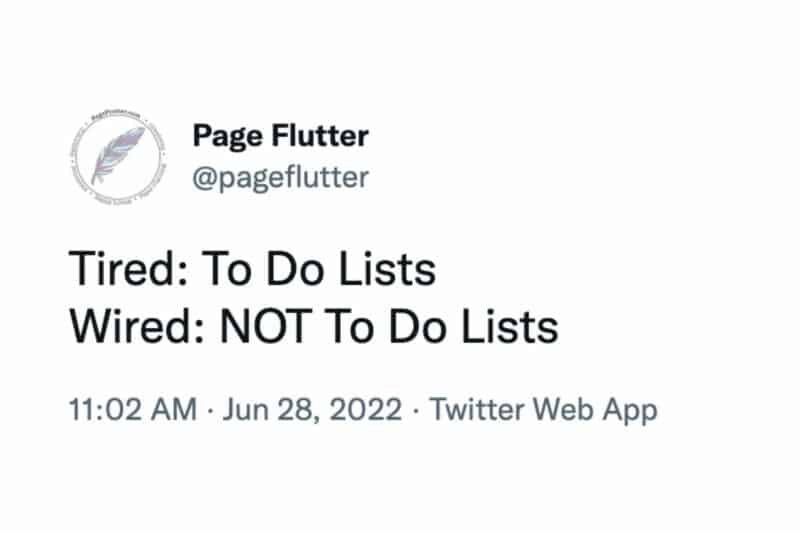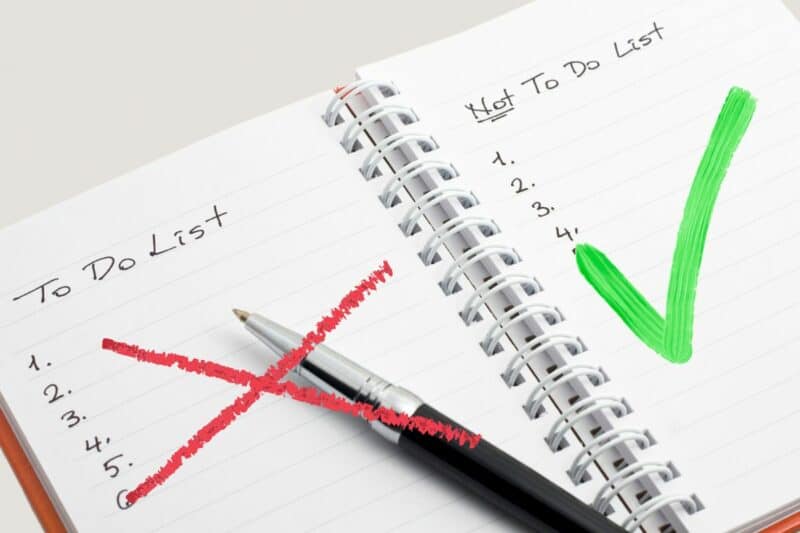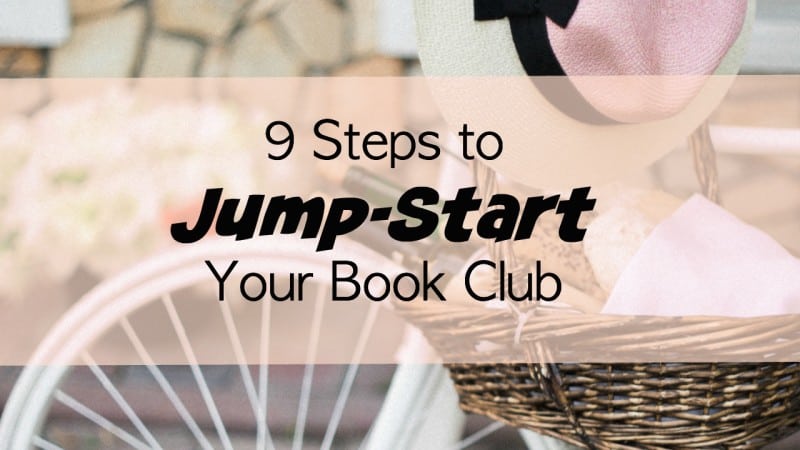Do you need a not to do list in your life and in your journal? Probably! Find out what a not to do list is and why it can help you take control of your life. Get started with your very own not to do list.
There’s nothing more frustrating than feeling like you’re constantly spinning your wheels, knowing you have a ton of things that need to be done, but feeling like you’re getting nowhere.
Or spending the precious moments of your life doing things other people think you should, on autopilot, but that don’t really suit you or what your heart is telling you to do.
Believe me, I’ve been there, and sometimes find myself back there again (and again).
Which is why I want to talk a bit about a not to do list.
A not to do list can be an awesome addition to your journal and your life. It can help you let go of the things that are no longer serving you. And free up time for the things that really matter.
Sounds ideal, doesn’t it?

What is a Not To Do List?
We all know about to-do lists, and prioritizing the items on them.
A not-to-do list is simply a master list where you systematically list – and then try to eliminate – the actions, habits, activities, etc. in your life that are no longer serving you.
It could be oriented towards your professional life, such as a list of all the distractions, bad habits, and time-wasters that keep you from being productive and making real, meaningful progress towards your true career goals.
By identifying and eliminating these distractions from your professional life, you can focus on what’s important and get more impactful tasks done first, and generally more done in less time.
A Not to Do List is also a great choice for your personal life. It could include negative emotions or behaviors you want to let go of, or anything else that is holding back your true self.
Whether personally or professionally focused, a not to do list sets a clear agenda, and helps point the way if you have trouble deciding on how you should act and spend your time from day-to-day, or even hour-to-hour.
It can also help you find bad habits in your personal or professional life, simply by identifying them and writing them down.
Why A Not Do List is so Important
1. It helps you focus on your priorities
When you have a lot of things on your to-do list, it makes it tough to know where to start and can result in your attention being split.
I remember reading a productivity hacks article that included this genius tip: last thing every work day, write down 6 things you need to complete the next day, in order of priority. Then, cross-off the 3 things at the bottom and just focus on your top 3 priorities.
A not-to-do list helps you make a conscious effort to only focus on the most important tasks that will get you towards your goals.
This way, you can avoid getting overwhelmed and stressed out, and helps you avoid spending all day (or week, or year) on low value tasks.
For an entire year, I lived by the mantra “no is the new yes” for my old blog, because I kept getting distracted by possible brand partnerships that weren’t really serving my audience or my goals, and therefore were kind of a waste of time! By simply ignoring the majority of the partnership emails, I freed up a ton of time and mental space to create the content I thought was most valuable.
This applies equally to your personal life, too. Maybe your not to do list includes things like “making excuses to avoid exercising” or even “putting other people’s needs above my own.”
Either way, it’s about taking back control of your time and prioritizing all the things that matter over those that don’t. And sticking to it on a daily basis.
2. It helps with procrastination and the downward spiral of procrastination
We all have those items on our to-do lists that we keep putting off because they’re either too difficult, too time-consuming, or too “something else”.
But…do you really need to do all of them? Or can you let go of some things?
By creating a not-to-do list full of unimportant tasks, or things that are on your list because you think you should do them (but in reality, not doing them wouldn’t actually cause any significant problems), you can systematically eliminate some of the less important tasks or things that are bothering you, forcing important things you might be avoiding to the top of your priority list.
You can also avoid what I call the downward spiral of procrastination, whereby you procrastinate on something, it nags at you, and then you get down on yourself and tell yourself, “I’m such a procrastinator.” As soon as you start telling yourself the “I’m a procrastinator” story, it then spirals and you loose confidence, and start procrastinating more. Downward spiral.
By getting rid of the things that aren’t really essential, you have less things to do, less chances and reasons to procrastinate, and are less likely to start down that spiral.
In the long run, it also means less emotional pressure, as you consciously let certain things go, and give yourself permission to just…not.
With that real and mental energy and time freed up, you can focus on the really important tasks and projects that would weigh on your subconscious if ignored.
3. It helps you stay organized
When you have a lot of things on your plate, it’s easy to let things fall through the cracks.
Having a not-to-do list ensures that you focus on the most important tasks, making it easier to ensure you don’t forget about any important tasks. This is super helpful when you’re using your journal for productivity and to stay on top of projects, tasks, events, etc., as there’s simply less stuff to track.
This way, you can stay on top of everything and avoid feeling overwhelmed.
4. It saves you time and mental energy in the long run
Trying to do too many things at once is a recipe for disaster.
By creating a not-to-do list, you can help yourself avoid the trap of taking on more than you can handle.
This refers to personal (I won’t feel the need to say yes to every social invitation) and professional things (I won’t feel the need to say yes to every special project at work).
This will save you time and energy in the long run, and let you focus on the things you do want to do, and then take much needed time out when it’s stuff you don’t care about.
5. It boosts your productivity
When you have a not-to-do list, you effectively set boundaries for yourself.
This can help you focus on the important tasks and avoid getting distracted. But it’s also a huge confidence and mental energy booster to have boundaries that are healthy for you, and stick to them.
As a result, you’ll be more productive and efficient in your work and personal life.
What Should Be on Your Not-To-Do-List?

Consider the Wheel of Life Approach
The Wheel of Life approach can be helpful when preparing your list, because it forces you to consider different aspects of your life, and not just work! The Wheel of Life includes the first 7 of these topics, but I added an 8th category – home – because to me that’s a huge area where people (women especially) take on more than we might need to.
Take some time to brainstorm the following 8 aspects of your life.
- Social
- Career
- Financial
- Spiritual
- Physical
- Intellectual
- Family
- Household
Social, Career, Financial, Spiritual, Physical, Intellectual, Family, Home
Make a list of Tasks You can Stop Doing or Change How You Do Them
Consider the 8 areas of life, and ask yourself which to dos are really distractions, which aren’t as important as you may thing, and which you can let go of.
Some questions or categories I like to consider include:
- It’s a distraction
- Doing busy work or low-value tasks first thing in the morning, rather than high-priority stuff that can move your projects, career, or business forward the fastest (see: the 80/20 rule).
- Spending your most focused hours on social media or e-mail, rather than doing deep work.
- It’s something you do out of habit or FOMO, but it doesn’t really serve you.
- Your regular after-work drinks date with colleague, where you often overdo it and sleep poorly or experience insomnia because of it.
- Time wasters like posting on Instagram constantly, or checking Twitter or Facebook out of habit, instead of at set times.
- You do it because you think others expect it of you, or out of perfectionism, but stopping or changing how you do it wouldn’t actually cause harm.
- Feeling the need to have a great manicure or hair, even though the appointments are expensive and take up too much of your time.
- Enrolling your kids in all the activities so they keep up with their peers, and taking on all the planning and scheduling yourself.
- Feeling the need to have a one-hour e-mail response time, or get to inbox zero.
- You don’t really need to do it. You can just ignore it.
- Doing all the dishes and wiping the counter before going to bed.
- You have enough money to hire someone to help, or can delegate to someone else.
- Meal prep, house cleaning, mother’s helper, professional organizer, etc.
- It is an energy draining activity, rather than an energy creating activity, and it’s not really necessary.
- Saying yes to every networking event, even though you don’t get true value out of them, and you’d be better served spending a few hours exercising or resting and recharging.
- Spending hours dealing with an unreasonable customer who you probably aren’t going to convince to stay as a customer anyway.
Be specific and set a deadline
The more specific you are about what’s on your not-to-do list, the easier it will be to avoid it.
Instead of, “I’m going to stop taking on all the household management,” try to think about what that means, and take it a step further.
- Stop taking on all the house cleaning myself. By the end of this month, I’ll have hired a housekeeper to come clean the house once per week.
Share your not-to-do list with someone:
Telling others about your plans will help you stick to them. You can even ask them to check in with you periodically to see how you’re doing.
Review your not-to-do list regularly:
As you make progress, take time to celebrate your accomplishments. This will motivate you to keep going and cross everything off your list!
Final Thoughts on Not To Do Lists
To stay on track and focused, and to live your best life more generally, what you don’t do matters as much as what you do. Let go of the non-essentials, and live life according to your own new rules.
It’s a liberating concept, isn’t it?
Having a not-to-do list is a great way to focus on what matters, and I hope this post inspires you do start your own!



